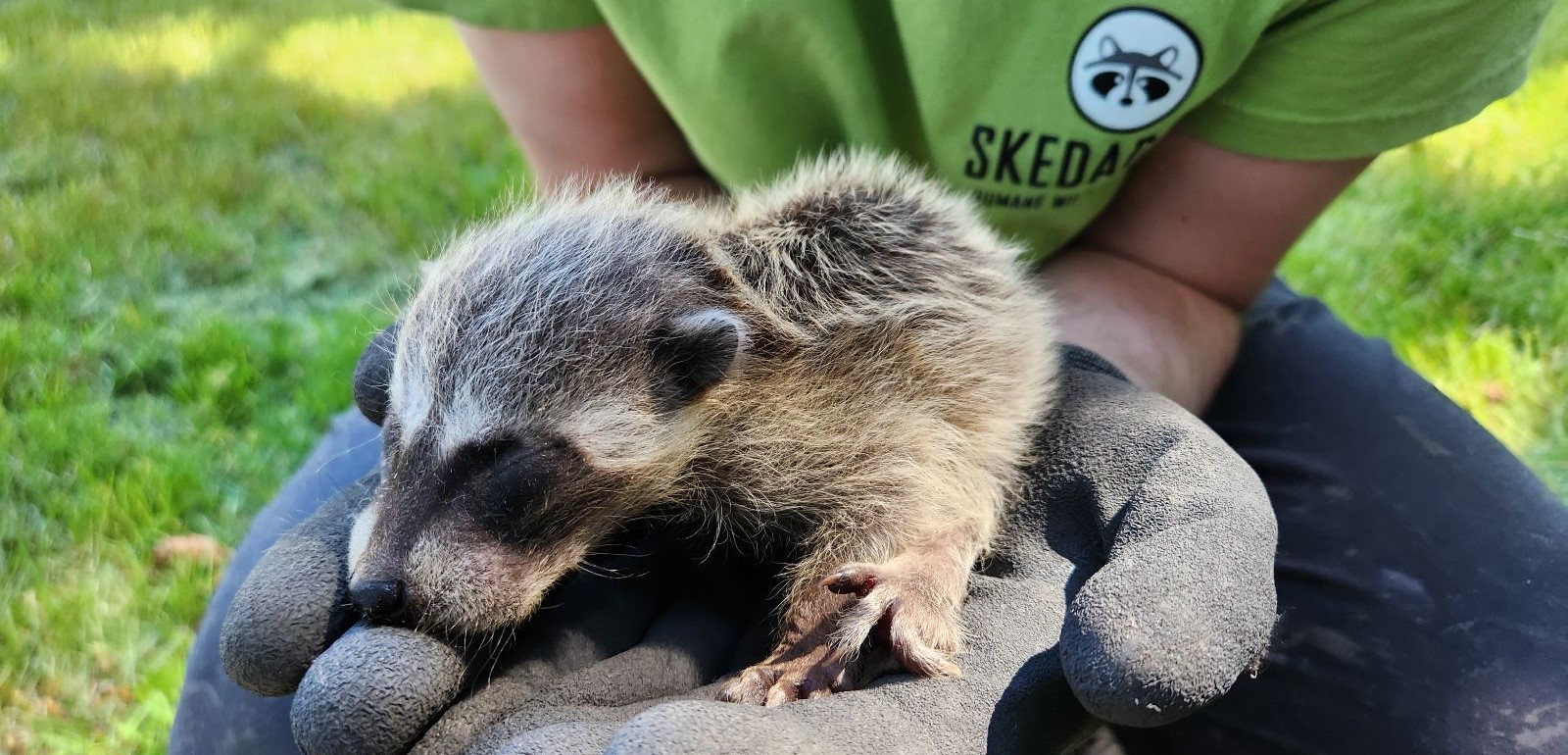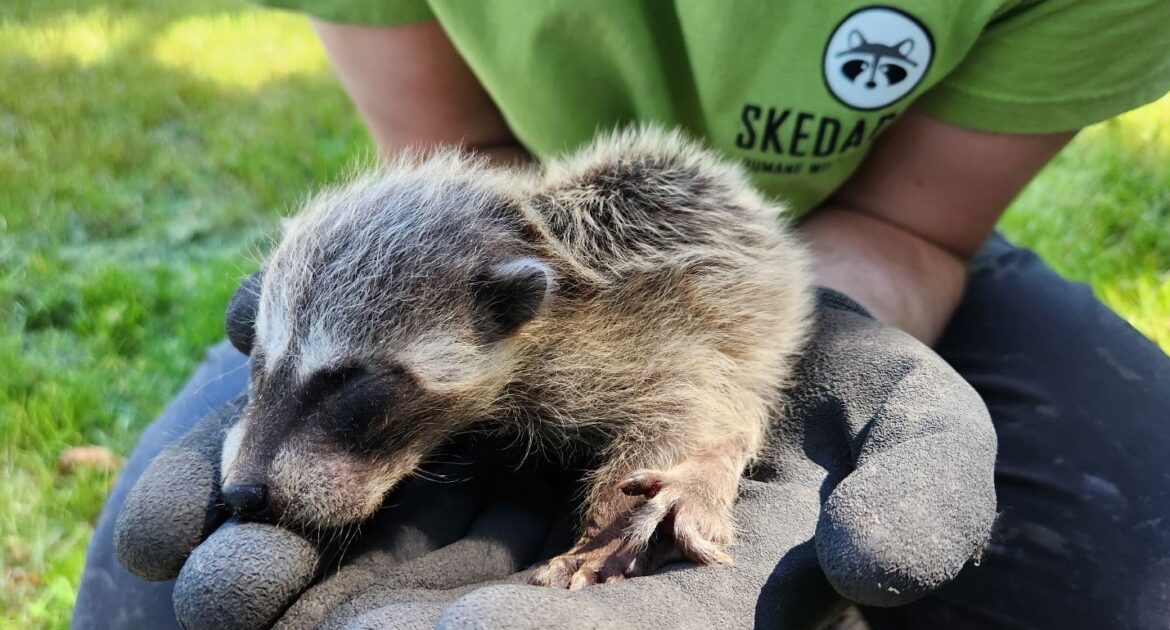Raccoons in cities are a common sight these days. They’re smart, adaptable, and, frankly, too comfortable living alongside us humans. But while they might seem harmless at first glance, they bring a lot of problems when they choose to make themselves at home in urban areas. From raiding garbage bins to damaging property, urban raccoon problems can’t be ignored.
Here in Ottawa, we’ve seen the struggles communities face when managing urban raccoons. At Skedaddle Humane Wildlife Control, we know the chaos raccoons can cause and how difficult it can be to deal with them safely and effectively.
But what exactly makes raccoons such a challenge in urban environments? Let’s break it down.
Why Are Urban Raccoons Such A Problem?
Raccoons are great at adapting. Over the years, they’ve figured out how to live in cities alongside humans. But this adaptability has led to some serious problems. Here’s what makes them a challenge:
They Thrive On Our Leftovers
Raccoons are opportunistic eaters, meaning they’ll eat just about anything. Urban areas provide endless food options for them. Unsecured garbage bins, compost piles, and even bird feeders attract raccoons in cities. Once they find a reliable food source, they keep coming back.
The Problem:
- They tear open garbage bags, leaving a mess.
- They damage bins and create sanitation issues.
- Food left outside can attract even more wildlife, creating bigger problems.
Property Destruction
When raccoons are searching for food or a cozy place to live, they don’t think twice about damaging your property. Roofs, attics, vents, and chimneys are all fair game.
The Problem:
- Roof shingles and vents get ripped apart as they search for entry points.
- Once inside, raccoons leave behind droppings and urine, causing odour and health concerns.
- Their nesting habits lead to insulation damage, weakened structures, and costly repairs.
Health Risks
Urban raccoon problems go beyond just damaging your property. These animals can also pose serious health risks to humans and pets. Their droppings can carry roundworm eggs, which are dangerous if accidentally ingested. Raccoons may also spread rabies through bites or scratches, putting anyone who comes into contact with them at risk.
On top of that, they can bring along parasites like fleas and ticks, which can harm both people and pets. These risks make it important to address raccoon issues quickly and safely.
Noise And Disturbance
If you’ve had a raccoon in your attic, you know how loud they can be. They scratch, scurry, and sometimes even fight, especially at night.
The Problem:
- Sleep disturbances for homeowners.
- Stress caused by strange noises coming from walls, ceilings, or rooftops.
They’re Smart And Persistent
Raccoons are incredibly clever animals. If there’s food hidden behind a sealed lid, they’ll find a way to pop it open. When they’re blocked from entering a home, they don’t give up easily. Instead, they’ll search for any weaknesses to exploit.
Traditional methods, such as using boards, traps, or fences, often don’t work against these persistent animals. They’re smart enough to outwit DIY deterrents, which can lead to more frustration, wasted time, and added costs in the long run.
They Multiply Quickly
Pest problems grow worse when wildlife starts multiplying, and raccoons are no exception. Female raccoons look for warm, safe spaces to have their babies, and urban homes provide ideal conditions.
The Problem:
- A single family of raccoons can lead to long-term damage to one property.
- Babies require extra care to handle safely during removal.
Managing Urban Raccoons Effectively
The key to managing urban raccoons is to prevent them from getting too comfortable. Here’s how you can keep them out of your space and under control:
Secure Your Home
Securing your home is one of the first steps to keeping raccoons away. Start by checking your roof and walls for any openings and sealing them up. Even tiny gaps can be an invitation for a raccoon to wander in.
Adding chimney caps and mesh covers to your vents can block off another access point. It’s also a good idea to fix any broken windows or loose siding that might make it easier for wildlife to get inside.
Eliminate Food Sources
Eliminating food sources is just as important. Using wildlife-proof garbage bins with secure lids can make a big difference. Be sure not to leave pet food or birdseed outside overnight, as these are easy snacks for raccoons. Compost should also be tightly sealed or properly contained to avoid inviting hungry animals to your yard.
Keep Your Property Unattractive To Wildlife
To make your property less appealing to raccoons, there are a few simple steps you can take. Trim back any tree branches that are close to your roof, as these can act like bridges for raccoons to climb onto your home. Motion-sensor lights are another effective way to keep nighttime visitors at bay.
Finally, clear away clutter from your yard where raccoons might find shelter or hiding spots. These small changes can help make your home less inviting for unwanted wildlife.
While these steps can help reduce the likelihood of raccoons causing problems, they aren’t foolproof. That’s where Skedaddle Humane Wildlife Control in Ottawa comes in. If raccoons have already made their way into your home, it’s crucial to handle the situation safely and humanely.
Why Choose Skedaddle?
At Skedaddle, we specialize in removing raccoons using methods that are safe for both you and the animals. We use one-way doors that allow raccoons to leave but stop them from coming back. This means we don’t rely on live trapping or relocation, which can stress the animals and lead to further issues. Instead, we focus on humane and effective solutions.
Our team will also inspect your home to fix entry points and prevent raccoons from returning. With over 30 years of experience, we’re proud to help Ottawa residents tackle urban raccoon problems with a focus on practical, long-lasting results.
Dealing With Raccoons? We Can Help!
Urban raccoon problems can quickly spiral out of control if not addressed. These animals are clever and resourceful, often causing damage to roofs, walls, and vents as they search for shelter in our homes.
Beyond property damage, raccoons in cities can also bring potential health risks. They may spread diseases like rabies and leave behind waste that can contaminate your living environment. Managing urban raccoons on your own isn’t just difficult; it can put your family and home at further risk without the right tools or expertise.
If you’re dealing with raccoons in cities, it’s important to take action quickly and responsibly. Skedaddle Humane Wildlife Control has been helping families manage urban raccoons for years, using methods that work safely and effectively. Our one-way doors, for example, guide wildlife out of your home while preventing them from coming back in. This approach ensures the animals are removed while protecting your property from further problems.
Don’t wait until urban raccoon problems get worse. If you’re struggling with managing raccoons in cities like Ottawa, reach out to Skedaddle Humane Wildlife Control today. Request an estimate now and take the first step toward a safer, raccoon-free home!




